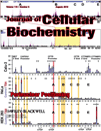
Cytoskeleton
Scope & Guideline
Connecting Researchers to the Heart of Cell Biology
Introduction
Aims and Scopes
- Actin Cytoskeleton Dynamics:
Research in this area focuses on the mechanisms of actin filament assembly and disassembly, the roles of actin-binding proteins, and the implications for cellular processes such as motility, division, and morphology. - Microtubule Structure and Function:
Studies explore the assembly dynamics of microtubules, the role of microtubule-associated proteins, and their significance in cellular processes, including cell division and intracellular transport. - Intermediate Filaments and Disease:
Research investigates the role of intermediate filaments in various cellular contexts, their mechanical properties, and how mutations or dysregulation can lead to diseases such as muscular dystrophies and neurodegenerative disorders. - Mechanobiology of the Cytoskeleton:
This area examines how mechanical forces influence cytoskeletal organization and function, incorporating studies on cell adhesion, migration, and the cellular response to physical stimuli. - Cellular Mechanotransduction:
Research focuses on how cells convert mechanical stimuli into biochemical signals, exploring the interactions between the cytoskeleton and the extracellular matrix. - Cytoskeletal Contributions to Cancer Biology:
Studies in this domain investigate how alterations in cytoskeletal dynamics and regulation contribute to cancer cell behavior, including invasion, metastasis, and drug resistance.
Trending and Emerging
- Role of Cytoskeleton in Cancer Progression:
Recent publications show a heightened focus on how cytoskeletal dynamics contribute to cancer cell behavior, particularly in terms of invasion and metastasis, signaling a significant interest in therapeutic implications. - Advanced Imaging Techniques:
The use of sophisticated imaging technologies, such as super-resolution microscopy and expansion microscopy, is on the rise, allowing for more detailed and dynamic studies of cytoskeletal structures in live cells. - Cytoskeletal Mechanotransduction:
Research is increasingly exploring how mechanical signals are sensed and transduced by the cytoskeleton, emphasizing the intersection of biophysics and cell biology. - Post-Translational Modifications of Cytoskeletal Proteins:
There is a growing interest in how post-translational modifications affect the function and dynamics of cytoskeletal proteins, which is crucial for understanding cellular responses to various stimuli. - The Role of Intrinsically Disordered Regions:
Emerging studies focus on the significance of intrinsically disordered regions in cytoskeletal proteins, which may play essential roles in regulation and interactions, reflecting a broader trend in protein research.
Declining or Waning
- Historical Perspectives on Cytoskeletal Research:
There seems to be a reduced emphasis on historical reviews and perspectives regarding cytoskeletal discoveries, with researchers now focusing more on current methodologies and innovations. - Basic Structural Studies without Functional Context:
Research that solely addresses the structural aspects of cytoskeletal components without linking them to functional implications appears less frequently, as there is a growing demand for studies that integrate structure with cellular function. - Plant Cell Cytoskeleton Studies:
While still present, the frequency of research specifically focused on the plant cytoskeleton has decreased, possibly due to a shift towards more universally applicable cellular models. - Non-Mechanobiological Cell Responses:
There is a decline in studies focusing solely on non-mechanical aspects of cytoskeletal functions, as the field increasingly recognizes the importance of mechanobiology in understanding cytoskeletal roles.
Similar Journals

JOURNAL OF CELLULAR BIOCHEMISTRY
Elevating Biochemical Insights for Tomorrow's ScienceJournal of Cellular Biochemistry is a premier academic journal dedicated to advancing the field of biochemistry and cellular biology. Published by Wiley, this influential journal has a significant impact factor that underscores its relevance and authority within the scientific community. With its ISSN 0730-2312 and E-ISSN 1097-4644, the journal has been on the frontier of research since its inception in 1982, and is expected to continue publishing cutting-edge studies through 2024. As evidenced by its ranking in the 2023 Scopus Quartiles, it holds a rank of Q2 in Biochemistry and Q3 in both Cell and Molecular Biology, placing it among the top tiers of scientific journals in these disciplines. The Journal of Cellular Biochemistry serves as a vital resource for researchers, professionals, and students alike, providing a platform for the dissemination of innovative ideas and findings that shape our understanding of cellular processes and biochemical pathways. Though it does not currently offer Open Access options, its robust peer-review process ensures that each publication meets the highest academic standards, thus solidifying its esteemed position in the landscape of biochemical research.

FEBS LETTERS
Shaping the Future of Biochemistry and BeyondFEBS LETTERS, published by Wiley, is a prestigious journal that has firmly established its place in the fields of biochemistry, biophysics, genetics, molecular biology, cell biology, and structural biology. With an esteemed history dating back to 1968, this journal continues to be a vital resource for researchers and professionals involved in the biological sciences. It boasts impressive quartile rankings, including Q1 statuses in several categories such as Biochemistry and Genetics, reflecting its high impact factor and significant contribution to scientific discourse. FEBS LETTERS provides a platform for innovative findings and critical reviews, fostering the exchange of knowledge and ideas within the scientific community. Although it operates under a subscription model, the journal ensures broad dissemination of groundbreaking research through its rigorous peer-review process. The vibrant discussions encouraged by articles published in FEBS LETTERS aim to inspire current and future generations of scientists to push the boundaries of biological understanding, making it an indispensable resource for anyone dedicated to advancing their knowledge in these dynamic fields.

BIOPHYSICAL JOURNAL
Shaping the future of biophysics through rigorous inquiry.BIOPHYSICAL JOURNAL, published by CELL PRESS, is a leading interdisciplinary platform dedicated to advancing the field of biophysics. With an ISSN of 0006-3495 and an E-ISSN of 1542-0086, this esteemed journal has garnered a prestigious position within the academic community, reflected in its ranking as Q1 in Biophysics for the year 2023. Its Scopus rank of #44/152 in the category of Biochemistry, Genetics, and Molecular Biology showcases its significant influence, with a notable percentile of 71st. Since its inception in 1960, the journal has published cutting-edge research that explores the quantitative and qualitative aspects of biological phenomena, making it essential for researchers, professionals, and students in the field. While the journal operates under a subscription model, its rigorous peer-review process ensures the highest quality of published work, contributing to groundbreaking discoveries and innovations that shape the future of biophysics. For more information or to explore the latest research, please visit the journal’s platform.

CELLULAR AND MOLECULAR LIFE SCIENCES
Shaping Tomorrow's Science Through Rigorous Research TodayCELLULAR AND MOLECULAR LIFE SCIENCES, published by SPRINGER BASEL AG, stands as a premier journal dedicated to advancing the field of cellular and molecular biology. With an impressive 2023 impact factor reflected in its Q1 rankings across key categories—including Cell Biology, Molecular Biology, and Pharmacology—it serves as a critical platform for researchers aiming to disseminate high-quality findings in these dynamic fields. Operated under an open access framework, the journal allows broader accessibility to groundbreaking research, fostering collaboration amongst scientists globally. Based in Switzerland, CELLULAR AND MOLECULAR LIFE SCIENCES has been at the forefront of scientific publishing since 1952, adapting to contemporary scientific challenges and trends, ultimately shaping the future of life sciences.

Frontiers in Cell and Developmental Biology
Illuminating the pathways of cellular and developmental science.Frontiers in Cell and Developmental Biology is a leading open-access journal published by FRONTIERS MEDIA SA, dedicated to advancing the understanding of fundamental biological processes at the cellular and developmental levels. Since its inception in 2013, the journal has positioned itself as a cornerstone of research in its field, achieving esteemed Q1 quartile rankings in both Cell Biology and Developmental Biology for 2023. With a robust Scopus ranking of #13 out of 82 in Developmental Biology and #67 out of 285 in Cell Biology, it represents a vital platform for innovative research and scholarly discourse. The journal provides a comprehensive and accessible avenue for researchers, professionals, and students alike to share high-quality findings and insights into cellular mechanisms and developmental processes, fostering collaboration and knowledge exchange in the global scientific community. Based in Lausanne, Switzerland, Frontiers in Cell and Developmental Biology is committed to open science, ensuring that all articles are freely accessible to the public, thereby broadening the impact of research in the biological sciences.

CELL RESEARCH
Unveiling the Mysteries of Cellular MechanismsCELL RESEARCH is a premier peer-reviewed journal dedicated to advancing the field of cell biology and molecular biology, published by SpringerNature. With an impressive impact factor and consistently ranking in the Q1 quartile for both cell biology and molecular biology, this journal serves as a pivotal resource for researchers, professionals, and students seeking to explore the latest discoveries and advancements in cellular mechanisms and their implications for health and disease. Since its inception in 1996, CELL RESEARCH has cultivated a distinguished reputation, currently boasting ranks in the top percentile of Scopus categories, reaffirming its influence and relevance to the scientific community. Although it is not an Open Access journal, its rigorous selection process ensures the publication of high-quality articles that contribute significantly to our understanding of life sciences. For those deeply engaged in the realms of biochemistry, genetics, and molecular biology, CELL RESEARCH is an essential conduit of innovative research and critical insights.

NATURE REVIEWS MOLECULAR CELL BIOLOGY
Pioneering knowledge synthesis in molecular and cellular biology.NATURE REVIEWS MOLECULAR CELL BIOLOGY, published by NATURE PORTFOLIO, stands as a seminal journal in the fields of cell and molecular biology, with a significant impact factor that underscores its influence and reputation within the scientific community. Established in 2000 and continuing its legacy into 2024, this journal delivers comprehensive reviews that synthesize current knowledge and advancements in molecular and cellular processes. Respected for its high-quality articles, it has maintained a prestigious Q1 ranking in both Cell Biology and Molecular Biology categories as of 2023. With an exceptional Scopus ranking, taking the top position in its category, it attracts a readership of prominent researchers, professionals, and students eager to stay abreast of groundbreaking discoveries and methodologies. Although it does not offer Open Access, subscribers benefit from exclusive access to vital insights that foster innovative research approaches and advancements in the life sciences. The journal’s objective is to bridge the gap between research and application, providing indispensable resources to its audience while contributing to the global conversation on molecular and cellular biology.

POSTEPY BIOLOGII KOMORKI
Advancing the Frontiers of Cell BiologyPOSTĘPY BIOLOGII KOMÓRKI is a pivotal journal in the field of cell biology, published by the renowned Polskie Towarzystwo Anatomiczne. Since its inception, this journal has been dedicated to advancing scientific knowledge through the dissemination of high-quality research articles, reviews, and original studies focused on cellular structure and function. Although POSTĘPY BIOLOGII KOMÓRKI does not currently operate as an open-access journal, it remains a significant resource for researchers and professionals alike, contributing to critical discussions and findings in the biological sciences. The journal has undergone coverage discontinuation in Scopus, yet it continues to serve as an essential platform in Poland for scholarly exchange in cellular and anatomical research. Situated at the Centrum Medyczne Kształcenia Podyplomowego in Warsaw, it aims to bridge gaps in understanding and nurture academic growth among students and professionals in the biological sciences.

JOURNAL OF CELLULAR PHYSIOLOGY
Illuminating the Pathway of Life at the Cellular LevelJOURNAL OF CELLULAR PHYSIOLOGY, published by Wiley, is a leading peer-reviewed journal that has been at the forefront of cellular research since its inception in 1945. With its prestigious Q1 and Q2 rankings in the fields of Clinical Biochemistry and Cell Biology, this journal is highly regarded within the scientific community, reflecting its significant impact factor and rigorous peer-review process. Addressing the intricacies of cell function and physiology, it serves as a crucial resource for researchers, professionals, and students dedicated to advancing knowledge in the life sciences. The journal publishes cutting-edge research articles, integral reviews, and significant findings that bridge basic biology and clinical applications, ensuring access to high-quality scholarly content that informs current practices and future research directions. Although not open access, the journal maintains a rich archive of studies, making it an essential reference point for those invested in the health and biological sciences.

JOURNAL OF MUSCLE RESEARCH AND CELL MOTILITY
Pioneering Research in Muscle Science and Cellular MovementJOURNAL OF MUSCLE RESEARCH AND CELL MOTILITY, published by Springer, is a premier journal dedicated to advancing our understanding of muscle biology and cellular motility. With an ISSN of 0142-4319 and an E-ISSN of 1573-2657, this journal stands out in the fields of biochemistry, cell biology, and physiology, proudly holding a Q2 ranking in each of these categories as per 2023 metrics. Covering significant developments from its inception in 1963 to its anticipated contributions through 2024, this journal serves as a vital platform for researchers and professionals to disseminate their findings and insights globally. Although it does not currently offer open access, its robust academic rigor and relevance are evident from its Scopus rankings, making it a crucial resource for those invested in the biological sciences. With a focus on original research articles, reviews, and methodological advancements, the journal fosters innovative collaborations and discussions within the scientific community, making it an invaluable addition to any researcher’s library.